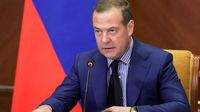As tensions escalate in Eastern Europe, former Russian President Dmitri Medvedev has made alarming accusations against the West, claiming that its actions are pushing the world toward a Third World War. In a recent statement on his official Telegram channel, Medvedev asserted that the West's policies regarding Ukraine are exacerbating nuclear armament globally and that the ongoing conflict represents a proxy war against Russia.
Medvedev, who currently serves as the deputy chairman of the Russian Security Council, stated, "The situation is such that even with a complete end to the conflict over the so-called 'Ukraine,' nuclear disarmament in the coming decades is impossible." He went on to warn that the world will inevitably create "new, more destructive types of weapons" and that more nations will acquire nuclear arsenals.
According to the Federation of American Scientists, the United States and Russia together hold about 88 percent of the world's nuclear weapons. Following Medvedev's remarks, analysts noted that his statements reflect the Kremlin's strategic thinking and its concerns about Western influence.
In a related development, a Moscow court recently imposed a fine of seven million rubles (approximately $80,000) on the messaging app Telegram for failing to remove content that allegedly incited extremist activities. The court's ruling, reported by the Russian news agency TASS, stated that Telegram had neglected its responsibilities as a media owner to eliminate channels that called for terrorist acts and protests aimed at overthrowing the Russian government in support of Ukraine.
Meanwhile, tensions between Russia and the UK have intensified following media reports alleging that Russian espionage sensors were deployed in the sea off the British coast. Russia's embassy in London vehemently rejected these claims, labeling them as a "hastily cobbled together science fiction story about a 'Russian threat.'" The embassy insisted that Russia has never posed a threat to the UK's security and accused the British government of using such accusations to justify increased military spending.
On the other side of the Atlantic, U.S. President Donald Trump has voiced his discontent over the ongoing bombardments of Ukraine by Russian forces. During a recent press briefing, Trump remarked, "I am not happy about all the bombings that have taken place in the last week; it's terrible, it's terrible." He emphasized the need to end the Russian aggression that has persisted since the invasion began over three years ago.
In the city of Krywyj Rih, the impact of these bombings was tragically evident, as a recent attack resulted in the deaths of 20 individuals, including nine children and adolescents. The U.S. has been actively engaging in discussions with both Russia and Ukraine regarding potential ceasefire agreements, although Moscow has set preconditions that complicate the negotiations.
Amidst these developments, Ukrainian President Volodymyr Zelensky has confirmed for the first time that Ukrainian troops are conducting operations in the Russian region of Belgorod. In his evening video address, Zelensky stated that the Ukrainian commander-in-chief reported on their presence in both the Kursk and Belgorod regions, underscoring Ukraine's commitment to protecting its territories from Russian occupation.
Zelensky declared, "Our main goal remains the same: to protect our country and our communities in the Sumy and Kharkiv regions from the Russian occupiers." Ukrainian forces have been active in the Kursk area since August 2024, and Zelensky's comments mark a significant acknowledgment of military operations beyond Ukraine's borders.
In a separate interview, Russian Ambassador to Germany, Sergej J. Netschajew, made threats against Germany, further escalating diplomatic tensions. The interview, conducted by ARD journalist Anne Will, revealed the ambassador's aggressive stance towards Western nations.
Additionally, the European satellite company Eutelsat has been tasked with ensuring communication in Ukraine, as its CEO admitted the company is struggling to keep pace with Elon Musk's Starlink service, which has been instrumental in providing connectivity during the conflict.
As the situation evolves, British intelligence has reported a slowdown in Russian advances within Ukraine, indicating that the military landscape remains challenging for both sides. The ongoing conflict continues to draw international attention, with Ukraine sending a delegation to negotiate a raw material deal, highlighting the economic implications of the war.
Since the onset of the conflict on February 24, 2022, Ukraine has been defending itself against the Russian invasion, with military experts describing the situation as increasingly dire. The Ukrainian army has managed to occupy a small area of Russian territory in the Kursk region, but recent reports indicate that Ukrainian forces have faced significant setbacks.
As the war continues, the world watches closely, with the potential for further escalation looming. The implications of Medvedev's remarks, the ongoing military actions, and the international responses will undoubtedly shape the future of not only Ukraine but also global security dynamics.






